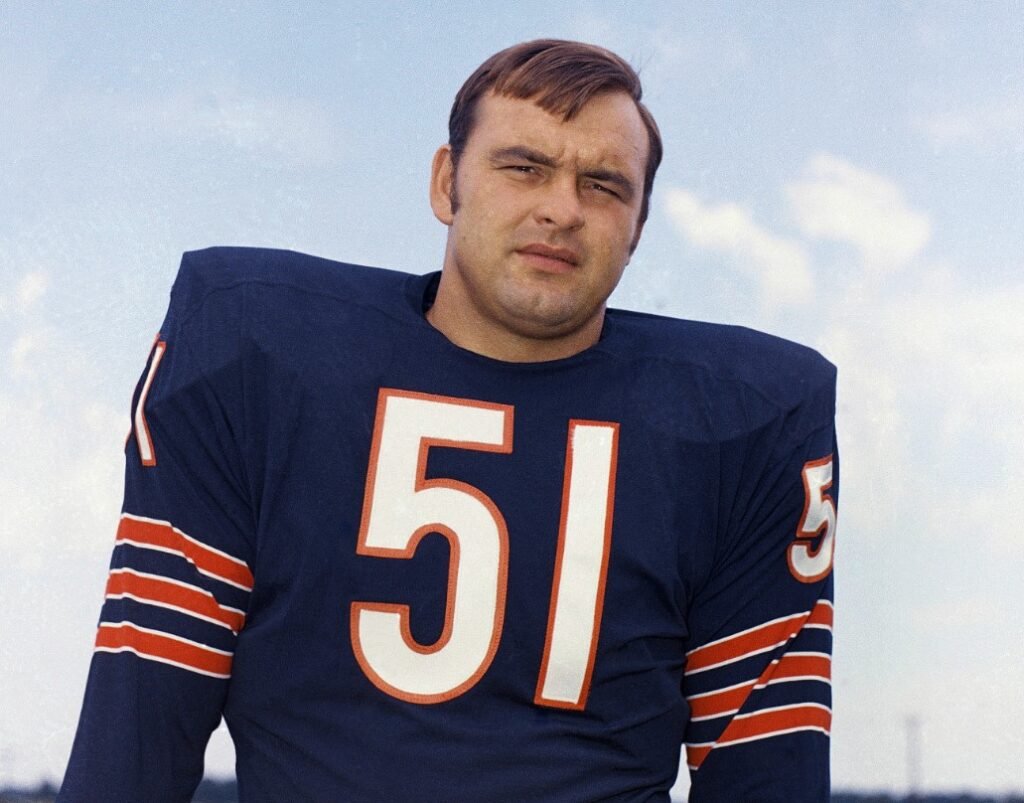Dick Butkus, the Pro Football Hall of Fame linebacker who played for his hometown Chicago Bears and became one of the most feared and respected defenders in NFL history, has died at the age of 80, the team announced on Thursday. According to a statement released by the team, Butkus’ family confirmed that he died in his sleep overnight at his home in Malibu, California.
Butkus was a first-team All-Pro five times and made the Pro Bowl in eight of his nine seasons before a knee injury forced him to retire at 31. He was elected to the Pro Football Hall of Fame in 1979, his first year of eligibility. He is still considered one of the greatest defensive players of all time, and his number 51 jersey is retired by the Bears.
Butkus was known for his speed, strength, toughness, and intensity on the field. He delivered punishing hits to opposing players, often causing fumbles or injuries. He was also a leader and a vocal presence on the Bears’ defense, inspiring his teammates with his passion and work ethic.
Butkus was born and raised in Chicago, where he attended Chicago Vocational High School and starred as a fullback and linebacker. He then went on to play for the University of Illinois, where he won the Outland Trophy and the Maxwell Award as the best lineman and the best player in college football, respectively. He was also a two-time consensus All-American and finished third in the Heisman Trophy voting in 1964.

A career cut short by injury
The Bears drafted Butkus with the third overall pick in the 1965 NFL draft, along with another future Hall of Famer, running back Gale Sayers, who was selected with the fourth pick. The two became close friends and teammates, and were both featured in a famous Sports Illustrated cover story in 1970 titled “The most feared man in the game (Butkus) … and the most loved (Sayers)”.
Butkus quickly established himself as one of the best linebackers in the league, earning Rookie of the Year honors and leading the NFL in tackles in his first season. He continued to dominate for the next seven years, recording 22 interceptions, 27 fumble recoveries, and an unofficial 1,020 tackles in his career. He was also named the NFL Defensive Player of the Year twice, in 1969 and 1970.
However, Butkus’ career was cut short by a series of knee injuries that required multiple surgeries and hampered his mobility and effectiveness. He played his final game in 1973, and sued the Bears for negligence and malpractice for their handling of his injuries. The lawsuit was settled out of court in 1976.
A successful transition to acting and broadcasting
After retiring from football, Butkus pursued a career in acting and broadcasting. He appeared in several movies and TV shows, such as The Longest Yard, Brian’s Song, Gremlins 2: The New Batch, My Two Dads, Hang Time, and Blue Thunder. He also hosted a sports trivia show called Sports Challenge and served as a color commentator for NBC’s NFL coverage.
Butkus also remained involved with football as a coach and an advocate. He coached linebackers for the Chicago Blitz of the USFL in 1984, and was briefly the head coach of the XFL’s Los Angeles Xtreme in 2001. He also created the Butkus Award, which is given annually to the best linebacker in college football since 1985. The award was later expanded to include high school and professional players as well.
Butkus was also active in various charitable causes, such as supporting organ donation, fighting steroid abuse among young athletes, and promoting health and fitness among children. He also wrote several books about his life and career, including Stop-Action: A Memoir of a Life on Film (1979), Butkus: Flesh and Blood (1997), and The Ten-Minute Drill: How to Get Fit Faster (2007).
A legacy that lives on
Butkus’ death has sparked an outpouring of tributes from fans, former teammates, fellow Hall of Famers, current players, coaches, and media members. Many have praised him as one of the best ever to play the game, a role model for generations of linebackers, a loyal friend and family man, and a beloved icon of Chicago sports.
Butkus is survived by his wife Helen, whom he married in 1963; his three children Rick, Nikki, and Matt; his nine grandchildren; and his brother Ron. The Bears said they will honor him with a moment of silence before their next home game against the Green Bay Packers on October 15.
